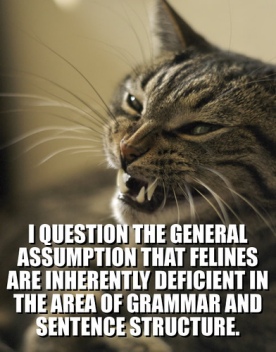From the beginning years of grade school, you were admonished to “watch your grammar.” Through the years growing up, your grammar was corrected, your papers were graded on the use of proper grammar, and you were advised to fix your grammar.
Now you have made that final step and there is no turning back. You have decided, “I am a writer.” Great! Now you can finally use all those perfect grammar skills that have been demanded from you all those years. Are you ready? No? Good.
Is it correct to be grammatically correct? The short answer is ‘sometimes’. Should you write that way? Sometimes. In fact, there are no doubt some wonderful tombs parked somewhere on dusty shelves written entirely in perfect grammar, although I haven’t actually seen any personally. Should you write your story in correct grammar? Probably some, but not all of it.
As a writer, correct grammar is just as important as it was in grade school. But, it is also important to know when ignore those grammar rules.
 Consider the rough character. He has lived on the streets, surviving the best he can. He has a full history of problems and hardships that have driven him to this point. Now imagine that character talking and thinking in perfect grammar.
Consider the rough character. He has lived on the streets, surviving the best he can. He has a full history of problems and hardships that have driven him to this point. Now imagine that character talking and thinking in perfect grammar.
Good writing draws the reader in. It flows in their mind so that they are absorbed into the world you created, feeling and living it without consciously reading it.
Now here is a writing exercise you can practice anywhere. Pay attention. Pay attention and take mental note of the conversations around you and the words going through your own mind; not so much on what is being said, but on how it is being said.
Most people do not think or speak in proper grammar. They use contractions a lot and at some point break various other perfect grammar rules. People also often speak in incomplete sentences and using the forms slang speech common to their particular lifestyle, background, and community. Speech and thoughts expressed in perfect grammar sounds formal. It could be a good tool as well when you want that formal feeling in your story. But it won’t likely draw the reader into the story in the long run.
You want your story to flow in the same way that most people’s thoughts flow naturally. You want your characters and the situations you put them in to feel real. Use formal proper grammar where needed, but also know that a more casual flow of thoughts and words are essential to make a story flow naturally.

No comments:
Post a Comment